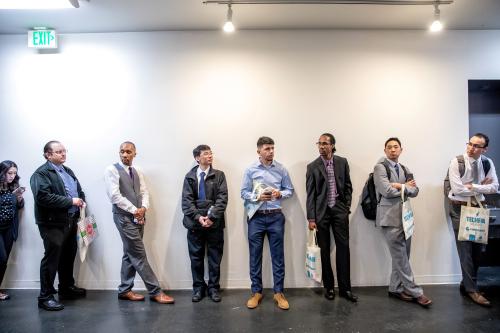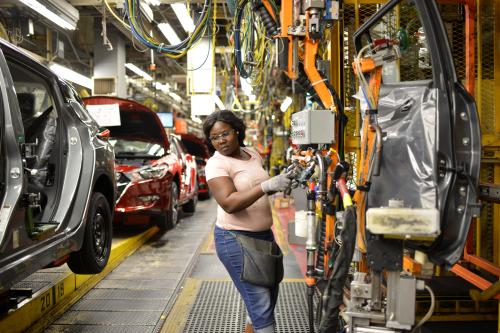This article originally appeared in the Guardian on July 3, 2019, as part of the Guardian series on Broken Capitalism.
Love? Love fades away. But things? Things are forever.” So says Tom, played by Aziz Ansari, in a scene from Parks and Recreation. The phrase has become a meme, a tongue-in-cheek defense of modern materialism.
The essential thinginess of capitalism has been one of its most-criticized features. Materialism, and specifically consumerism, are almost always used as pejorative terms. Nostalgic conservatives, egalitarian progressives and environmentalists loudly agree on at least one thing: we are just buying too much stuff.
They’re not wrong. The U.S. self-storage market is already worth $38 billion, and growing fast. Almost one in ten households are now renting extra space. One feature of late capitalism is that many of us have more things than we have space for things.
At its best, however, consumerism is a powerful, positive force. It allows for the expression of identity, it can hold sellers to public account, and it drives new thinking and development. But this is only the case when consumers are being served fairly in the market. Today, there is a pressing concern about whether the forces of “bigness” – a trend toward fewer larger companies – combined with a reluctance on the part of governments to intervene in consumer markets, is dampening innovation and narrowing choice.
Before worrying about whether the market is serving consumers, we need to agree that it should. Critiques of consumerism have to be taken seriously before examining whether contemporary capitalism is friendly to consumers. These critiques usually come in four types: moral, aesthetic, financial, or environmental.
The moral critique of consumerism is that the acquisition of things displaces more worthwhile activities or priorities. Instead of shopping, we should be spending time with friends and family, in places of worship, or in nature. Even as consumer societies meet our immediate, shallow desires, they are said to corrode our deeper selves. “They do not rejoice in what they have, no matter how much it is, so much as they lament what they still lack, or think they lack. Their soul is eaten away with cares as they compete in the struggle for success.” That was Saint Basil the Great, sometime around the middle of the fourth century.
But although materialism can be demoralizing and dispiriting, it is so probably only for a small minority of people. In reality, it is a question of balance. Things can be really useful, really cool or really fun. They can also enhance social life rather than diminish it.
Back in the 1980s, the psychologist Milhaly Csikszentmihalyi interviewed all the members of 82 Chicago families about their favorite things. He discovered that happier families listed objects that reminded them of other people; a family memento, or a couch that had been in the family for years. Less happy ones listed more expensive items, citing their features rather than their history.
Csikszentmihalyi’s conclusion, in his 1981 book The Meaning of Things, is that the “work” of consumption does not end with the purchase; in fact, that is when it starts. Some things might prove to be worthless, others merely useful, but some acquire more meaning over time. It is not whether we consume things that matters, but how we do.
The second criticism of consumerism is aesthetic. Here the problem is the brashness, the showiness of material consumption, whether of goods or services. The aesthetic critic highlights not how much we consume, but what we consume. This criticism veers dangerously close, or even into, outright snobbery, as James Twitchell points out in his pro-consumption polemic Lead Us Into Temptation. “Often the melancholy Eeyores condemning your consumption are confusing what you buy with what they buy,” Twichell writes. “They can spend thousands of dollars hiking in Provence, but don’t you even think of gambling away a sawbuck in Las Vegas.”
This is a salutary warning to consumerism’s critics. In Britain during the 1970s, when cheaper air travel brought travel to warmer summer vacation destinations within reach of millions of workers, there was considerable elite disdain. The Labour politician Tony Crosland fired back: “My working-class constituents … want washing machines and refrigerators to relieve domestic drudgery … and they want package tour holidays to Majorca. Why should they, too, not enjoy the sun?” Why indeed?
Third on the list of criticisms of consumerism is financial – specifically, the impact on personal finances of buying lots of stuff now, often using debt to do so, and putting too little aside for the future. We are induced, through sophisticated advertising efforts, to consume even more than we would in the absence of ministrations of marketeers. The knock against consumerism is that it displaces wiser spending or saving.
As a rule, people find it hard to put high value on the distant future. Economists call this tendency “hyperbolic discounting.” John Stuart Mill noted that people “often reach for the nearer good, even though they know it to be less valuable.” Note that the problem is not information – we know it to be less valuable. The problem is short termism.
This is hardly a new problem, it is just that mature economies offer such a cornucopia of goods and services – available, now, at the click of a mouse – and life expectancy has risen so dramatically, that the challenges may now be greater. This, in turn, has justified collective interventions: most obviously, forced savings plans to fund government-provided pensions.
It is a delicate balance, however. The same economists who worry about people saving enough for their retirement or for a negative life event worry on a different day about insufficient consumer demand. The solutions are less likely to lie in the direction of reduced consumer choice, however, than in the greater provision of public goods that act to protect us from ourselves.
The fourth, and deepest, criticism of consumerism is environmental. Things take energy to make, transport, and use. Many services are energy-intensive too, with air travel just the most obvious example. Energy is scarce, and currently produced in ways that are heating up the planet.
Consumerism, on this reading, is killing the planet. The only way to save the planet is to reduce energy use. And the only way to do that is to reduce consumption. But it is not clear that these statements are true. There are clean energy alternatives available, it’s just a question of collectively moving towards them.
The best of all worlds is probably to combine a carbon tax with a consumption tax, thereby pricing in externalities, and broadening the tax base to boot. Then we might be able to tax work a little less, which would help hard-pressed families.
There is, then, nothing intrinsically bad about consuming goods and services, and much that is good. Hence few critics of consumerism really want to turn back the clock. But it is important that the market serves consumers, as much as the other way round. That requires both to be protected: consumers need protection from predatory, corrupt or dishonest sellers; and the market needs protection from monopoly power, predatory pricing, and cronyism.
“Consumer protection” and “government regulation” have become curse words on the contemporary political right. But there are many consumer markets in which the stakes are high, and in which there is a stark asymmetry of information between buyer and seller. In these cases, such as financial services, there is a strong case for protection and regulation. The notion of “consumer sovereignty” – that consumers exert power and authority over companies as an automatic result of market forces – is doubly dangerous, implying first that consumers always outrank workers and citizens, and second that consumers are all-powerful. In many cases, most consumers are unable to acquire the necessary knowledge to act even remotely regally in the market.
Of course consumer protection can veer into paternalism. There is always a balance to be struck. Consumers are best served in markets that remain open and competitive. The statecraft required here is to encourage the creation of markets that do not leave consumers entirely at the mercy of companies, but without putting companies at the mercy of government. Somewhere between the Wild West and wartime rationing is what we are after.
Edward Kleinbard, author of “We Are Better Than This: How Government Should Spend Our Money,” writes that the binary distinction between socialist and capitalist economies misses the point. What we need, he argues, are “friendly” markets. These are markets which are both competitive and complete.
In a competitive market, Kleinbard argues, “no business can dictate prices to customers; all fight for survival in environments where profit margins are slim.” This is not about being friendly to companies, but rather creating a “marketplace where businesses scrap for every little advantage.”
This is one reason many contemporary economists are concerned about the dominance of particular sectors by a small number of companies. This is hardly a new worry. Most advanced economies have laws guarding against monopolies for precisely this reason, with ongoing political arguments about how tough these laws should be.
For some, big is necessarily bad. For others, necessarily beautiful. But of course it depends. Does it matter that Starbucks now has 40% of the retail coffee market, and Dunkin’ the next 30%? Probably not. There is nothing they can do to stop new entrants taking them on, just as nobody could stop a couple of teachers and a writer in Seattle from starting Starbucks in Pike Place in 1971, and then expanding to 14,000 stores worldwide.
The problem comes when companies become so large that they can defend themselves with economic “moats” against competition, by influencing policy to bend regulation and tax policy in their favor, snatching up likely rivals almost as soon as they hatch, and dominating the channels through which consumption takes place.
Critically, a market that is friendly to consumers is not necessarily a market that delivers the lowest prices to consumers. But price has been the principal litmus test of mergers and acquisitions since Robert Bork’s influential 1978 book “The Antitrust Paradox.” (The evidence on how mergers influence price is in fact mixed).
Of course price matters, a lot. Economic hardship can be caused as readily by high costs as by low incomes. But consumers also need reassurance about future prices. Being at the mercy of a single company is bad: even if the company is merciful right now, what happens if it becomes less so in the future?
The second test of a “friendly” market, according to Kleinbard, is completeness. This test is passed when “reasonable economic desires find outlet in markets open to all under fair terms of participation.” Most competitive consumer markets effectively complete themselves, providing different kinds and quality of goods and services to buyers of all kinds. But there are some goods and services where completeness requires regulation. Education and health care are two cases in point. To ensure access to all, these industries require heavy regulation or direct government provision. These are public goods, not private ones.
That there are limits to free markets, especially in these kinds of areas, is accepted across the political spectrum. The argument is not over whether the government should reach into these arenas, but how far.
So: consumption is not intrinsically bad. Indeed, buying things is one of the joys and privileges of a modern capitalist economy. But most of us, myopic creatures that we are, need a little help balancing present consumption with future consumption. The planet needs a lot of help to ensure that our consumption does not deplete our shared resources. Consumers need protection in high-stakes, complex areas like financial services, and public provision in others like health care and education.
As well as becoming richer consumers, we also need to become better consumers. Not just in terms of being mindful of the impact of our consumption on the health of ourselves and the earth, but in discerning the kinds of consumption that will bring us the greatest benefits.
Tibor Skitovsky, a Hungarian-American economist, argued that as opportunities for consumption expand, we need to be more skillful consumers, seeking out opportunities for what he called “creative consumption”, focused on novelty and stimulation, rather than satiation. One of the deep problems with poverty, according to Skitovsky, is that it cuts people off from these consumption opportunities. You need money to consume; and you need more to consume creatively.
In developed capitalist economies, our role as consumers does not trump our role as workers or citizens. But it is an important role nonetheless and one we should aim to improve in. Think of all the training that goes into being a better worker. Even a tiny fraction of that might make a difference in terms of making us better consumers. In the end, the promise of capitalism to consumers lies not only in the hands of the regulators, marketeers, and providers, but also in the pocketbooks of consumers themselves.
The Brookings Institution is committed to quality, independence, and impact.
We are supported by a diverse array of funders. In line with our values and policies, each Brookings publication represents the sole views of its author(s).






Commentary
Op-edConsumerism isn’t a sellout – if capitalism works for all
July 19, 2019